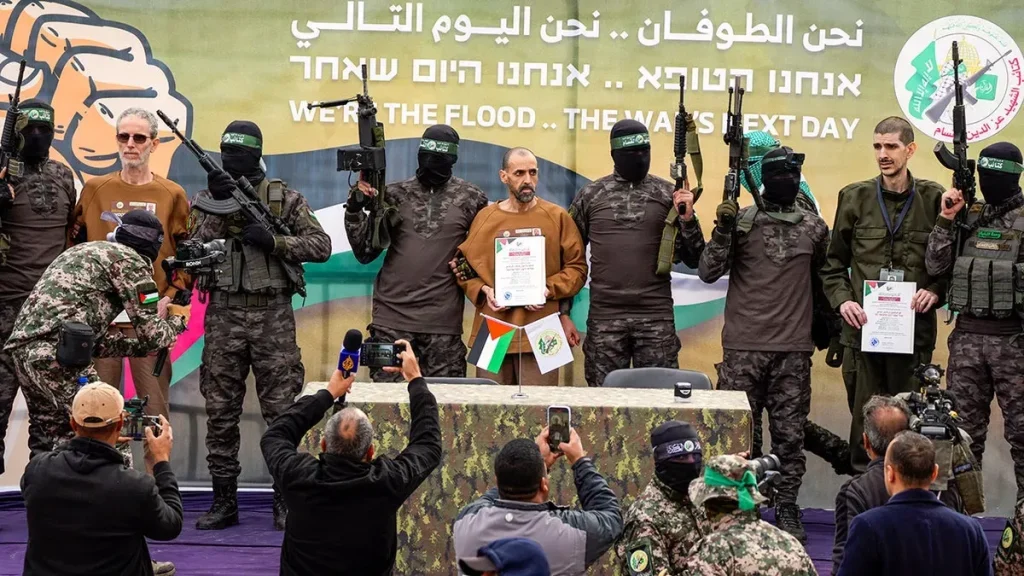In a significant development surrounding the Hamas hostage release, Edan Alexander, a dual U.S. and Israeli citizen, is set to be freed from captivity in Gaza. This decision marks a potential turning point in the volatile dynamics of the Israel Gaza conflict, as Alexander is believed to be the last living U.S. citizen held hostage by Hamas. Khalil al-Hayya, the head of Hamas’ negotiating team, indicated that this move is part of broader efforts to facilitate a ceasefire and restore humanitarian aid to the region. The U.S. special envoy, Steve Witkoff, has affirmed the agreement and is traveling to oversee the final steps of the release, accentuating the role of diplomacy in this complex hostage crisis. As families and officials alike hope for an end to the suffering, the implications of this hostage release extend far beyond individual lives, touching on the heart of the ongoing tensions in the region.
Hamas has made an agreement to let go of hostages in recent negotiations, and Edan Alexander, who holds both U.S. and Israeli citizenship, is one of the focus figures in this situation. This development comes amidst the ongoing disputes and conflicts between Israel and Gaza, raising hopes for a possible resolution to the long-standing issues. The release is being heralded as a positive sign in light of the previous negotiations that aimed to halt hostilities and allow humanitarian efforts to progress. Insight from U.S. officials highlights the depth of discussions leading to this agreement, which also points towards a wider context of international diplomatic interventions. As the world watches closely, the situation encapsulates a critical moment in the complex landscape of Middle Eastern politics.
Hamas Hostage Release: A Turning Point in U.S.-Israel Relations
The recent decision by Hamas to release Edan Alexander signifies a potential turning point in the complex web of U.S.-Israel relations. Alexander, a dual U.S. and Israeli citizen, has been captive in Gaza since October 7, 2023, when he was taken hostage alongside numerous others during the escalation of violence in the region. With ongoing negotiations being led by U.S. Special Envoy Steve Witkoff, this release underscores the critical role that diplomatic mediation plays in resolving hostage crises, particularly in the context of the broader Israel-Gaza conflict.
Hamas’s gestures, such as the release of Alexander, are often perceived as diplomatic moves intended to foster negotiations and reduce hostilities. The involvement of global mediators, including Qatar and Egypt, is crucial in these discussions, aiming to navigate the difficult landscape of peace talks. This event not only affects the families of hostages but also influences the political dynamics between the United States, Israel, and Palestinian factions, potentially paving the way for a more durable solution in the conflict.
Impacts of the Hostage Crisis on Families
Families of hostages like Edan Alexander endure unimaginable stress as they wait for news of their loved ones. The hostage crisis is not just a political issue; it profoundly affects the emotional and psychological well-being of those involved. The Alexander family, for instance, has remained in ongoing contact with U.S. authorities, illustrating the personal stakes within the broader geopolitical turmoil. Communities across the U.S. and Israel rally around such families, demonstrating solidarity and support as they navigate these anxious times.
The emotional toll of waiting for a loved one to be released can be crushing, resulting in families grappling with uncertainty and fear for their safety. As negotiations proceed, the Alexander family’s response—expressing relief and hope—reflects a universal desire for closure. This highlights the need for transparency and communication from authorities involved in the hostage negotiations, ensuring families are kept informed as situations evolve.
The Role of U.S. Diplomacy in Hostage Negotiations
U.S. diplomacy plays a vital role in addressing hostage situations, especially in conflict zones such as Gaza. The agreement to release Edan Alexander was confirmed by U.S. Special Envoy Steve Witkoff, who emphasized the efforts exerted by various stakeholders to secure this release. Witkoff’s commitment to traveling to Israel underscores the active engagement of the U.S. in seeking resolutions to crises that not only involve American citizens but also influence international relations.
The U.S. involvement adds a layer of complexity to the negotiations with Hamas, a group recognized by many as a terrorist organization. The delicate balance of power and the various interests at play require U.S. diplomats to navigate carefully to achieve favorable outcomes. Hostage negotiations are particularly challenging as they involve not just the well-being of hostages like Alexander but also the broader implications for the Israel-Gaza conflict and U.S. relations with both nations.
Geopolitical Implications of Alexander’s Release
The release of Edan Alexander carries significant geopolitical implications, especially regarding the ongoing Israel-Gaza conflict. It could serve as a catalyst for renewed negotiations aimed at achieving a ceasefire and addressing humanitarian concerns in Gaza. With Hamas signaling its willingness to engage in dialogue following the release, the international community is watching closely to see how these developments might influence the fragile stability in the region.
This incident also reflects the broader implications of U.S. involvement in Middle Eastern conflicts, where hostage situations often intersect with national security interests. As global powers continue to engage in diplomatic maneuvers, the outcome of such negotiations sets precedents that could affect future interactions between states. The interplay of U.S. diplomacy and regional players like Hamas will be critical in shaping the trajectory of peace efforts and addressing the humanitarian crisis in Gaza.
Hostage Family Forum’s Advocacy Role
The Hostage Family Forum plays a crucial role in advocating for families affected by hostage situations, like that of Edan Alexander. By providing support and amplifying their voices, the Forum seeks to raise awareness about the challenges faced by families who have loved ones held captive by militant groups. Their advocacy efforts are tailored to ensure that hostages and their families remain at the forefront of discussions, urging governments and the international community to take meaningful action.
This organization emphasizes the emotional and practical support needed by families during such crises. Keeping families informed and involved in the negotiation processes fosters a sense of community and empowerment, allowing them to advocate for their loved ones amidst their distress. The work of groups like the Hostage Family Forum highlights the intersection of personal narratives with larger political dynamics, reminding stakeholders that behind every negotiation, there are real lives affected by the outcomes.
Trump’s Involvement in Hostage Negotiations
Former President Donald Trump’s involvement in the hostage release of Edan Alexander has stirred discussions regarding the influence of political leadership in diplomatic negotiations. Trump expressed gratitude toward the mediators and highlighted the importance of goodwill gestures in international relations. His emphasis on this release as a step towards potentially resolving the Israel-Hamas conflict illustrates how political narratives can shape public perception of diplomatic achievements.
The dynamics of leadership during such high-stakes events are pivotal. Trump’s acknowledgment of the behind-the-scenes work and negotiations reinforces the notion that political actors play critical roles in securing outcomes that impact not just families but the entire geopolitical landscape. As the situation evolves, the implications of his administration’s approach could also influence future negotiations involving other hostages and broader peace efforts in the region.
The Evolving Situation in Gaza After Alexander’s Release
Following the news of Edan Alexander’s release, the situation in Gaza remains tense as Israeli military operations continue. Prime Minister Benjamin Netanyahu’s recent announcements regarding Israel’s strategy reflect the ongoing complexities of navigating a resolution to the Israel-Gaza conflict. The military’s intention to take control of Gaza poses significant concerns for the over 2 million Palestinians living in the region, further complicating humanitarian efforts.
The international community’s response to these developments will be crucial in shaping future actions. The interplay between military strategy and diplomatic negotiations presents a challenging landscape for both local and global actors. As humanitarian aid struggles to reach those in need due to an enduring blockade, the pressure mounts on governments and organizations to find solutions that ensure the safety and security of all civilians affected by the conflict.
Hamas and U.S. Relations: A Complex Web
The relationship between Hamas and the U.S. is inherently complex, characterized by hostility and occasional negotiations surrounding humanitarian issues and hostage crises. The release of Edan Alexander opens a dialogue regarding the potential for further negotiations with Hamas, particularly in light of the recent gestures of goodwill. Such dynamics could pave the way for more structured discussions about ceasefires and aid provisions for those affected by the ongoing conflict.
Understanding Hamas’s motivations and the U.S.’s strategic interests is essential in grasping the nuances of their interactions. While past negotiations have often faltered, moments like Alexander’s release may inspire new avenues for dialogue. However, the underlying tensions and differing political aims must be addressed to create conditions conducive to more sustainable peace processes in the future.
Humanitarian Concerns Amid Political Maneuvering
As the hostage release unfolds, the humanitarian concerns in Gaza remain pressing. With the potential for increased military operations and a complete blockade, the civilian population faces dire conditions exacerbated by ongoing conflicts. The international community, including organizations like the United Nations, continues to call for access to humanitarian aid for those affected by the conflict. Ensuring that aid does not become a tool of political leverage is crucial for alleviating the suffering of innocent civilians caught in the crossfire.
The plight of Palestinians in Gaza intensifies with each passing day of conflict. The humanitarian crisis serves as a stark reminder of the consequences of wars, where the most vulnerable bear the brunt of political decisions. As discussions regarding hostages continue, it is imperative to keep humanitarian considerations at the forefront of negotiations, ensuring that aid reaches those in desperate need amidst the ongoing turmoil.
Frequently Asked Questions
What is the status of Edan Alexander’s release involving Hamas hostage negotiations?
Edan Alexander, a dual U.S.-Israeli citizen believed to be the last American hostage in Gaza, is set to be released as part of ongoing Hamas hostage negotiations. This decision is seen as a step towards achieving a ceasefire and allowing humanitarian aid to flow into Gaza, according to Hamas leader Khalil al-Hayya.
How is the U.S. government involved in the Hamas hostage release of Edan Alexander?
The U.S. government, represented by special envoy Steve Witkoff, is actively involved in the negotiations for Edan Alexander’s release. Witkoff confirmed that efforts have been made to finalize the release, indicating it could happen soon while expressing gratitude to those who facilitated the negotiations.
What are the implications of Edan Alexander’s Hamas hostage release on the Israel Gaza conflict?
Edan Alexander’s release from Hamas is viewed as a potential turning point in the ongoing Israel Gaza conflict. It may indicate a pathway towards negotiations aimed at a more lasting peace, as well as a goodwill gesture in U.S.-Hamas relations, especially following President Trump’s involvement.
Why did Hamas agree to release Edan Alexander as part of the hostage crisis resolution?
Hamas agreed to release Edan Alexander as part of broader negotiations aimed at addressing the hostage crisis and facilitating a ceasefire. Khalil al-Hayya noted that this decision aligns with their desire to open crossings for humanitarian aid and further discussions to end hostilities.
What prior agreements existed between Hamas and Israel regarding hostage releases?
In January, Hamas and Israel had previously agreed to a temporary ceasefire during which some hostages were released in exchange for Palestinian prisoners in Israeli custody. However, subsequent conflicts caused the ceasefire to collapse before any sustainable agreement could be reached.
What does Edan Alexander’s release mean for the families of hostages still held by Hamas?
Edan Alexander’s imminent release is a source of hope for the families of other hostages still held by Hamas, showcasing the possibility of negotiation and the return of loved ones. The Hostage Family Forum stated they are in contact with authorities to facilitate future releases.
How does President Trump view the Hamas hostage release of Edan Alexander?
President Trump has expressed optimism regarding Edan Alexander’s release from Hamas, stating that it could signify a step towards ending the conflict. He has acknowledged the role of mediators like Qatar and Egypt in resolving the hostage situation.
What were the circumstances surrounding Edan Alexander’s captivity with Hamas?
Edan Alexander was captured by Hamas on October 7, 2023, while serving in the Israel Defense Forces. He was taken hostage alongside approximately 250 others, and his parent’s ongoing advocacy highlights the personal aspect of the broader hostage crisis.
What are the ongoing negotiations between Hamas and the U.S. related to Edan Alexander’s release?
Ongoing negotiations between Hamas and the U.S. focus on enabling Edan Alexander’s release, with efforts led by special envoy Steve Witkoff aiming to ensure his safe return. The negotiations highlight complex diplomatic efforts to resolve hostage situations amidst the ongoing conflict.
How have international bodies responded to the hostage crisis related to Hamas?
International bodies, including representatives from the United Nations and Palestinian authorities, have condemned the use of hostages and aid during the ongoing Israel Gaza conflict, indicating the broader humanitarian and legal implications of the situation surrounding Hamas and the hostages.
| Key Points | Details |
|---|---|
| Hamas Agrees to Release Hostage | Edan Alexander, a dual U.S. and Israeli citizen, is believed to be the last U.S. citizen held in Gaza. |
| Negotiation Insights | U.S. Special Envoy Steve Witkoff confirmed the agreement and is traveling to Israel to secure the release. |
| Goodwill Gesture | The release is seen as a positive step towards peace by President Donald Trump. |
| Family Reaction | The Alexander family expressed gratitude and is in contact with U.S. officials. |
| Historical Context | Alexander was taken hostage during an attack on October 7, 2023; earlier negotiations in March did not conclude successfully. |
| Ongoing Conflict | The situation in Gaza remains tense, with significant military operations planned by Israel. |
Summary
The release of Edan Alexander marks a significant moment in the ongoing Hamas hostage release debate. It highlights the complexities of negotiations surrounding hostages amidst the broader conflict between Israel and Hamas. The hope is that this release could pave the way towards a more substantial peace process, facilitating further discussions about the many hostages still held and the need for a lasting resolution in Gaza.



